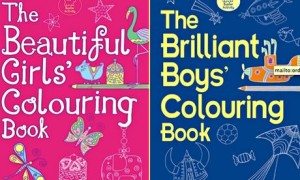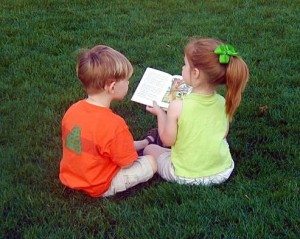Let Books Be Books
[dropcap]G[/dropcap]irls are fascinated by pretty butterflies, cakes, flowers, fashion and dolls, whilst the sole appeal of aeroplanes, cars, swords and guns, farts, snot, pirates, football and adventure is to boys. Right?
Wrong. A national campaign has been launched with the intent of deterring publishers and retailers alike from the promotion of “limiting gender stereotypes” in their marketing of children’s books. Let Books be Books, the latest branch of the parent-led Let Toys be Toys campaign, requests for the cessation of gendered labelling “in the title or in the packaging” of these books.
To interpret the campaign as intended for the banning of gender-minded books is ultimately to misunderstand it; rather than looking to prevent the publication of content, the campaign seeks to extend the reach of content through rendering the books inclusive and accessible to children of either sex. [pullquote style=”left” quote=”dark”]A good book, it is thought, should be open to anyone.[/pullquote]
Given the uproar surrounding Bic’s launch of pink and purple pens “designed to fit comfortably in a woman’s hand” and the speculation around the gendering of Kinder eggs (pink containing dolls and blues containing toy cars for girls and boys respectively), it is hardly surprising that gendering within the literary world, too, is being called into question.
The campaign, in all its publicity, has successfully mobilised public opinion, forcing individuals to form their own stances on the matter. Warwick students appear as passionate as any; English and Philosophy student, Tess Gullis comments, “It’s good to see more controversy with regards to pointlessly gendered items.” Cassia Lonsdale (studying Classics) is similarly opinionated, saying that, “Tackling these issues of stereotyping at their root – in childhood- is vital. These kind of assigned gender roles can cause school-ground bullying and that’s just not right.”
The campaign, launched on the 5th March, fast gained momentum; having acquired approximately 5,000 signatures on its online petition and attracted a host of support from leading literary lights (Malorie Blackman, poet laureate Carol Ann Duffy, Philip Pullman and children’s laureate Anne Fine to name but a few), the movement is having considerable impact.
The high-profile names have undoubtedly boosted the campaign’s publicity, causing a handful of publishers, namely Parragon and Usborne, to pledge their support. Katy Guest, literary editor of The Independent on Sunday, meanwhile, has vowed not to review any gender stereotyped children’s books out of principle.
Even Waterstones, Britain’s largest specialist bookseller, have provided their backing. Spokesman John Howells explains that “there are better ways of choosing for children than basing it on whether they are a boy or a girl.” They state that, “if a shop ever goes off-piste and does [a gender-specific display] we soon find out about it and get it removed.”
 The support for the campaign, however, is not as unanimous as it may seem. Children’s publisher, Buster Books, have defended titles such as The Brilliant Boys’ Colouring Book and The Beautiful Girls’ Colouring Book on the grounds that they are easier to sell. The owner of the company, Michael O’Mara, maintains that “it is a fact of life how a very large percentage of people shop when buying for kids, do it by sex.”
The support for the campaign, however, is not as unanimous as it may seem. Children’s publisher, Buster Books, have defended titles such as The Brilliant Boys’ Colouring Book and The Beautiful Girls’ Colouring Book on the grounds that they are easier to sell. The owner of the company, Michael O’Mara, maintains that “it is a fact of life how a very large percentage of people shop when buying for kids, do it by sex.”
He explains, “we know for a fact that when they are shopping on Amazon, they quite often type in ‘books for boys’ and ‘books for girls’.” O’Mara’s motivations, he unashamedly states, are governed by sales figures. He cites the 500,000 copies sold of The Girls’ Book over the 5,000 petition signatures as indicative of his priorities.
Such is not to suggest that this should be the case, however. Granted, it is common practice within marketing to target a specific segment of the population, but in the case of children’s books this comes with a certain amount of moral baggage. The fact that the only redeeming feature expressed in favour of gender-specific books has its foundations in their sales figures only illustrates further the degree to which it is a cynical marketing tool – one which is both restrictive and ultimately harmful.
 Question, for a second, the basic motivations of a parent in supplying his or her children with books. Often answers will involve words like “open”, “broaden”, “expand”, followed by words like “imaginations”, “minds”, “horizons”. The practice of gender-specific books, then, does exactly the opposite in perpetuating these stereotypes – in signposting the targeted gender audience, publishers engage in a reductive process of pigeonholing, closing down “whole words of interest” for the said children.
Question, for a second, the basic motivations of a parent in supplying his or her children with books. Often answers will involve words like “open”, “broaden”, “expand”, followed by words like “imaginations”, “minds”, “horizons”. The practice of gender-specific books, then, does exactly the opposite in perpetuating these stereotypes – in signposting the targeted gender audience, publishers engage in a reductive process of pigeonholing, closing down “whole words of interest” for the said children.
In modern day society, it seems absurd that publishers can go on propagating such a seemingly archaic practice, delineating gender roles as if a child’s interests are somehow preset or fixed. Of course, it may seem expedient to purchase the Boys’ Activity Book for little Ollie and the female alternative for Olivia, but question for a moment the implications behind this decision. The more comprehensive eradication of these titles from our shelves must begin at the customer.
Comments